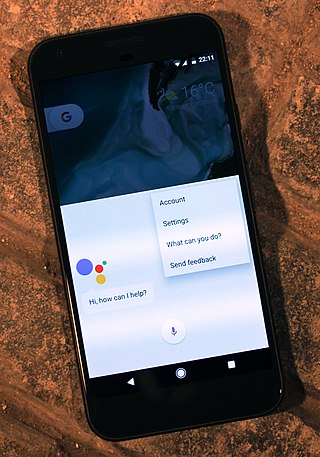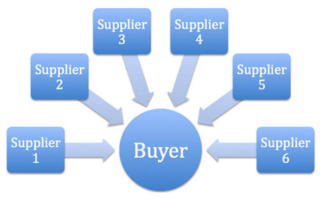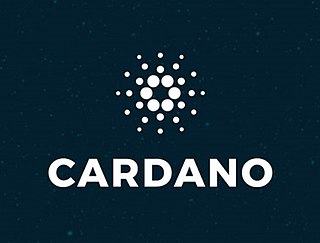A shill, also called a plant or a stooge, is a person who publicly helps or gives credibility to a person or organization without disclosing that they have a close relationship with said person or organization. Shills can carry out their operations in the areas of media, journalism, marketing, politics, sports, confidence games, cryptocurrency, or other business areas. A shill may also act to discredit opponents or critics of the person or organization in which they have a vested interest.

An auction is usually a process of buying and selling goods or services by offering them up for bids, taking bids, and then selling the item to the highest bidder or buying the item from the lowest bidder. Some exceptions to this definition exist and are described in the section about different types. The branch of economic theory dealing with auction types and participants' behavior in auctions is called auction theory.

An online auction is an auction held over the internet and accessed by internet connected devices. Similar to in-person auctions, online auctions come in a variety of types, with different bidding and selling rules.

A multi-agent system is a computerized system composed of multiple interacting intelligent agents. Multi-agent systems can solve problems that are difficult or impossible for an individual agent or a monolithic system to solve. Intelligence may include methodic, functional, procedural approaches, algorithmic search or reinforcement learning.

Auction sniping is the practice, in a timed online auction, of placing a bid likely to exceed the current highest bid as late as possible—usually seconds before the end of the auction—giving other bidders no time to outbid the sniper. This can be done either manually or by software on the bidder's computer, or by an online sniping service.
A smart contract is a computer program or a transaction protocol that is intended to automatically execute, control or document events and actions according to the terms of a contract or an agreement. The objectives of smart contracts are the reduction of need for trusted intermediators, arbitration costs, and fraud losses, as well as the reduction of malicious and accidental exceptions. Smart contracts are commonly associated with cryptocurrencies, and the smart contracts introduced by Ethereum are generally considered a fundamental building block for decentralized finance (DeFi) and NFT applications.
The Internet of things (IoT) describes physical objects with sensors, processing ability, software and other technologies that connect and exchange data with other devices and systems over the Internet or other communications networks. Internet of things has been considered a misnomer because devices do not need to be connected to the public internet, they only need to be connected to a network, and be individually addressable.

An intelligent virtual assistant (IVA) or intelligent personal assistant (IPA) is a software agent that can perform tasks or services for an individual based on commands or questions. The term "chatbot" is sometimes used to refer to virtual assistants generally or specifically accessed by online chat. In some cases, online chat programs are exclusively for entertainment purposes. Some virtual assistants are able to interpret human speech and respond via synthesized voices. Users can ask their assistants questions, control home automation devices and media playback via voice, and manage other basic tasks such as email, to-do lists, and calendars with verbal commands. A similar concept, however with differences, underlies the dialogue systems.

A reverse auction is a type of auction in which the traditional roles of buyer and seller are reversed. Thus, there is one buyer and many potential sellers. In an ordinary auction also known as a forward auction, buyers compete to obtain goods or services by offering increasingly higher prices. In contrast, in a reverse auction, the sellers compete to obtain business from the buyer and prices will typically decrease as the sellers underbid each other.

Ethereum is a decentralized, open-source blockchain with smart contract functionality. Ether is the native cryptocurrency of the platform. Among cryptocurrencies, ether is second only to bitcoin in market capitalization.
A blockchain is a distributed ledger with growing lists of records (blocks) that are securely linked together via cryptographic hashes. Each block contains a cryptographic hash of the previous block, a timestamp, and transaction data. The timestamp proves that the transaction data existed when the block was created. Since each block contains information about the previous block, they effectively form a chain, with each additional block linking to the ones before it. Consequently, blockchain transactions are irreversible in that, once they are recorded, the data in any given block cannot be altered retroactively without altering all subsequent blocks.

Fintech, a portmanteau of "financial technology", refers to firms using new technology to compete with traditional financial methods in the delivery of financial services. Artificial intelligence, blockchain, cloud computing, and big data are regarded as the "ABCD" of fintech. The use of smartphones for mobile banking, investing, borrowing services, and cryptocurrency are examples of technologies designed to make financial services more accessible to the general public. Fintech companies consist of both startups and established financial institutions and technology companies trying to replace or enhance the usage of financial services provided by existing financial companies.
Hyperledger is an umbrella project of open source blockchains and related tools that the Linux Foundationstarted in December 2015. IBM, Intel, and SAP Ariba have contributed to support the collaborative development of blockchain-based distributed ledgers. It was renamed Hyperledger Foundation in October 2021.
A decentralised application is an application that can operate autonomously, typically through the use of smart contracts, that run on a decentralized computing, blockchain or other distributed ledger system. Like traditional applications, DApps provide some function or utility to its users. However, unlike traditional applications, DApps operate without human intervention and are not owned by any one entity, rather DApps distribute tokens that represent ownership. These tokens are distributed according to a programmed algorithm to the users of the system, diluting ownership and control of the DApp. Without any one entity controlling the system, the application is therefore decentralised.

Cardano is a public blockchain platform. It is open-source and decentralized, with consensus achieved using proof of stake. It can facilitate peer-to-peer transactions with its internal cryptocurrency, ADA.

TRON is a decentralized, open-source blockchain-based operating system with smart contract functionality, proof-of-stake principles as its consensus algorithm and a cryptocurrency native to the system, known as Tronix (TRX). It was established in March 2014 by Justin Sun and since 2017 has been overseen and supervised by the TRON Foundation, a non-profit organization in Singapore, established in the same year. It was originally an Ethereum-based ERC-20 token, which switched its protocol to its own blockchain in 2018. TRC20 has a fee of 5 trones per 1 USDT coin for the transfer. On some cryptocurrency wallets, you can't withdraw your USDT funds until you have enough money for the network fee.
Government by algorithm is an alternative form of government or social ordering where the usage of computer algorithms, especially of artificial intelligence and blockchain, is applied to regulations, law enforcement, and generally any aspect of everyday life such as transportation or land registration. The term "government by algorithm" appeared in academic literature as an alternative for "algorithmic governance" in 2013. A related term, algorithmic regulation, is defined as setting the standard, monitoring and modifying behaviour by means of computational algorithms – automation of judiciary is in its scope. In the context of blockchain, it is also known as blockchain governance.
Regulation of algorithms, or algorithmic regulation, is the creation of laws, rules and public sector policies for promotion and regulation of algorithms, particularly in artificial intelligence and machine learning. For the subset of AI algorithms, the term regulation of artificial intelligence is used. The regulatory and policy landscape for artificial intelligence (AI) is an emerging issue in jurisdictions globally, including in the European Union. Regulation of AI is considered necessary to both encourage AI and manage associated risks, but challenging. Another emerging topic is the regulation of blockchain algorithms and is mentioned along with regulation of AI algorithms. Many countries have enacted regulations of high frequency trades, which is shifting due to technological progress into the realm of AI algorithms.
Decentralized finance offers financial instruments without relying on intermediaries such as brokerages, exchanges, or banks by using smart contracts on a blockchain. DeFi platforms allow people to lend or borrow funds from others, speculate on price movements on assets using derivatives, trade cryptocurrencies, insure against risks, and earn interest in savings-like accounts. DeFi uses a layered architecture and highly composable building blocks. Some applications promote high interest rates but are subject to high risk. Coding errors and hacks have been common in DeFi.
Algorand is a cryptocurrency protocol providing proof-of-stake on a blockchain. Algorand's native cryptocurrency is called ALGO.







